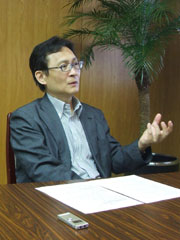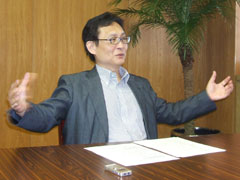Interview【JICA-RI Focus Vol.1】Interview with Director Keiichi Tsunekawa, Part I
2009.04.20

The JICA Research Institute (JICA-RI) was established on October 1, 2008 in conjunction with the merger of the Japan International Cooperation Agency (JICA) and the overseas economic cooperation operations of the Japan Bank for International Cooperation (JBIC). Through interviews and reports, this column - JICA-RI Focus - will acquaint the reader with the institute's international cooperation and development research activities.
Volumes 1 and 2 feature interviews with newly inaugurated JICA Vice President and JICA-RI Director Dr. Keiichi Tsunekawa about the significance of the new institute and his ambitions for it.
What types of issues do developing countries presently face and why is it important for JICA-RI to engage in its study?
International aid institutes have a variety of tasks, of which the most pressing are the following three:
1.(Promoting Peace and Development)
The 1990s were an era of armed conflicts leading to a great many deaths and creating innumerable refugees. While conflicts continue in some regions, most seem to have been settled since the beginning of this century. Unfortunately however, we can never be sure that peace is here to stay and that there is not another conflict just around the corner. The international community has a great responsibility in stabilizing peace because the maintenance of peace is necessary for economic development and improved quality of life in developing countries. Armed conflicts in the developing world could affect those who live in developed nations as well; for example, through the refugee problem.
2.(Facilitating Growth and Poverty Reduction)
With the rising prices of natural resources, developing countries with exportable resources are beginning to enjoy the benefits of economic growth. So that these benefits are not temporary, the next task is to leverage this opportunity into sustainable growth so that mistakes made during the oil shock of the 1970s are not repeated. At the same time that resource-rich countries are benefiting, resource-poor countries are being penalized by soaring energy and food costs. Those among them with some strength in manufacturing can export their products. This brings us to a third group of countries -- those with neither natural resources nor manufacturing industries. We, the international community, must find ways to work with these countries. Even if an ideal market-based solution is not at hand, humanitarian support is still imperative.
3.(Manage Climate Change and Development)
Climate change was one of the main discussion topics of the Hokkaido Toyako G8 Summit hosted by Japan. Though the effects of climate change are widespread, developing countries are especially vulnerable to climate-related natural disasters, such as droughts and floods, and so must prepare adaptive measures. Measures to curb greenhouse gasses are also necessary, and it will be important for developing countries to participate in discussions concerning emissions reductions.
What are JICA-RI's strengths compared with other national and international research institutes?
Being a new institute, we are still seeking out what we can offer. Yet already I can point to areas where JICA-RI has advantages: 1) Unlike most other global aid organizations, JICA works with three aid modalities -- grants, loans and technical cooperation. JICA-RI is thus well positioned to study multi-dimensional and comprehensive issues; 2) JICA-RI has access to volumes of data from decades of experience gained from former JICA and JBIC projects worldwide. As these data and case studies are written mostly in Japanese, the researchers of our institute are at an advantage in working with them.
How will JICA-RI disseminate its research results? Who are the main audiences?
Although we have no magic formula for global dissemination, our target audiences are clear: 1) those who are engaged in international development cooperation, including field practitioners; 2) tax-paying individuals and corporations in Japan to whom we owe accountability; 3) international aid organization partners (JICA counterparts overseas and multilateral organizations such as UNDP) with whom we hope to share experiences; and 4) domestic and international research and educational institutions that train future international aid researchers and practitioners.

We are weighing now how best to reach out to them. We will want to improve and enhance our English communication skills for audiences overseas. We also will want to present our research material and research results to both domestic and international audiences through seminars and symposiums. We will furthermore want to provide members of the Diet and other Japanese policy-makers with information about our activities. In addition, we hope to inform the Japanese public by co-hosting media events.
What do you think about collaborative studies?
Despite our institute's somewhat limited capacity, we have a vast number of research topics to tackle. Thus, we will collaborate with JICA Headquarters and with other organizations to pursue joint research projects. It will be important for practitioners and academics within JICA to work together as well as to interact with other domestic and international organizations. One possibility would be to invite researchers from universities on temporary assignment. Conversely, as part of our outreach activities, our JICA researchers could become visiting professionals at other organizations. Another possibility would be to engage in collaborative studies with foreign research teams. I would like to keep the options open.
What would you like most to do as the new JICA-RI director?
I would like to engage in studies that meet rigorous academic standards while still useful for practical implementation in the field. Having said that, I believe that we must keep a flexible perspective regarding the use of research results. It is conceivable, for example, that some conclusions of a comparative study about armed conflict will not point to concrete measures for immediate development assistance application. It is also conceivable that some solutions identified are not externally controllable in the short run; changing established relations among social groups, for example. Presenting research results as theoretical models while seeking methods of development implementation is going to be a journey of trial-and-error for us.
To be continued in Part II.

事業事前評価表(地球規模課題対応国際科学技術協力(SATREPS)).国際協力機構 地球環境部 . 防災第一チーム. 1.案件名.国 名: フィリピン共和国.

事業事前評価表(地球規模課題対応国際科学技術協力(SATREPS)).国際協力機構 地球環境部 . 防災第一チーム. 1.案件名.国 名: フィリピン共和国.

事業事前評価表(地球規模課題対応国際科学技術協力(SATREPS)).国際協力機構 地球環境部 . 防災第一チーム. 1.案件名.国 名: フィリピン共和国.

事業事前評価表(地球規模課題対応国際科学技術協力(SATREPS)).国際協力機構 地球環境部 . 防災第一チーム. 1.案件名.国 名: フィリピン共和国.

事業事前評価表(地球規模課題対応国際科学技術協力(SATREPS)).国際協力機構 地球環境部 . 防災第一チーム. 1.案件名.国 名: フィリピン共和国.
scroll